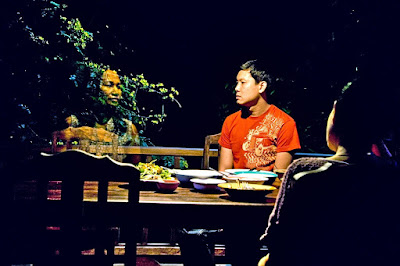When we think of ghost stories or journeys into the
afterlife we usually think of white winged angels, clouds and the sun or in
opposing cases frightening entities that threaten to take a film’s set of
characters down into the bottom of Hell itself.
Posited somewhere in the middle of these two opposite extremes audiences
have grown accustomed to is Thai writer-director Apichatpong Weerasethakul’s
mystical and transcendent 2010 Palme d’Or winner Uncle Boonmee Who Can
Recall His Past Lives, the first ever Thai film to win such a high honor.
A healthy if not matter of fact look at death and rebirth
that is at once distinctly Thai while also offering achingly beautiful supernatural
imagery tinged with magical realism, the film is as much about the process of
dying as the film itself unspooling in real time as a medium is dying off over
the course of the movie. Part of a loose
multi-platform art project embarked upon by Weerasethakul while also being an
autobiographical spiritual journey, watching the film is less of a piece of
conventional storytelling than it is a rite of passage. Despite the language and cultural barriers, the
film speaks to a universal experience we all confront in different forms or
another.
Somewhere between the spiritual battlefields
of Ingmar Bergman and Andrei Tarkovsky with the fleeting mystical beauties of Ron
Fricke, Uncle Boonmee Who Can Recall His Past Lives doesn’t so much try
to have the final word on the process of death and dying as it tries to
approach it from an angle we haven’t thought of before. While having no original score, the film is a dreamy if not
subtly haunted and spooky soundscape of ambience, trees and wind, heartbeats
and soft whispers. A film that works you
sonically into a strange headspace you’re not really sure how to react to, Uncle
Boonmee soon becomes a journey inward that gets increasingly surreal,
occasionally provocative and ultimately from a place that’s new and mysterious.
Performance-wise everyone does their job
pretty well, naturally settling into Weerasethakul’s painterly if not
otherworldly Thai landscapes. The real
star of this ensemble piece, however, is Weerasethakul himself who makes the
narrative design and structure of the film pointedly different than anything
audiences have come across about the nebulousness of the afterlife. In the years since winning the Palme d’Or and appearing on
numerous critical top ten lists for 2010, Weerasethakul has continued in the
direction of making mysterious genre-defying existential journeys through life
and death for the next ten years including but not limited to Cemetery of
Splendor and his limited-edition English-language toured theatrical film Memoria.
A director whose films are less analyzed and
discussed than they are felt and absorbed into our system and subconscious, the
cinema of Apichatpong Weerasethakul is startlingly refreshingly uncategorizable. Where most pictures have a beginning, middle
and end, Weerasethakul’s films and particularly Uncle Boonmee Who Can Recall
His Past Lives are less concerned with our final words about them than what
we take and internalize from them and how they exist in the memory. You don’t watch Weerasethakul’s films so much
as they imprint themselves into your heart and soul.
--Andrew Kotwicki





